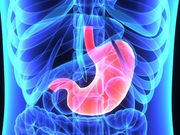ME-IEE may provide better diagnostic performance than conventional white light imaging
MONDAY, Sept. 12, 2016 (HealthDay News) — Magnifying endoscopy with image-enhanced endoscopy (ME-IEE) may provide better diagnostic performance than conventional white light imaging (C-WLI) for early gastric cancer, according to an article published online Aug. 31 in the Journal of Digestive Diseases.
Nei Soma, from Tsinghua University in Beijing, addresses the evaluation of high-risk patients for gastric cancer by endoscopy, focusing on the signs of suspicious lesions by C-WLI or chromoendoscopy (CE). In addition, the author presents endoscopic markers visualized by ME-IEE.
Soma notes that surface and color changes are distinct markers for detecting superficial mucosal neoplasia by C-WLI or CE; other markers include changes in light reflection and spontaneous bleeding. C-WLI endoscopy is the standard imaging modality for diagnosis of gastric mucosal cancers, but diagnosis of minute or superficial flat gastric cancers is difficult using C-WLI or CE; in these cases, advanced imaging is recommended. ME-IEE with narrow-band imaging with a classification system known as the vessel plus surface classification system (VSCS) was effective for identifying early gastric cancer, and may be able to differentiate between low-grade adenoma and early gastric cancer.
“Diagnosis using ME-IEE with VSCS may provide excellent diagnostic performance with high confidence and good reproducibility to the endoscopist if it is performed under consistent conditions, including observation under maximal magnification,” Soma writes.
Copyright © 2016 HealthDay. All rights reserved.








